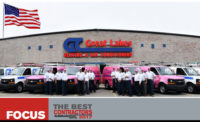Innovate Illinois, a public-private coalition dedicated to bolstering state innovation, recently celebrated the substantial federal award granted to the Great Lakes Water Innovation Engine, also known as Great Lakes ReNew. The U.S. National Science Foundation (NSF) has recognized this transformative initiative with up to $160 million over a 10-year span, naming it as one of the 10 meritorious Regional Innovation Engines selected from an initial pool of more than 700 submissions from across the nation.
Great Lakes ReNew, directed by Current, Chicago's premier water innovation incubator, is positioned to revolutionize water and resource recovery. The initiative aims to turn waste into wealth, exemplifying the mission of Innovate Illinois to foster economic growth through groundbreaking innovation.
ReNEW is working to address a national and global goal of net-zero emissions by 2050.
“The Great Lakes are a vital natural resource for the health, wealth, and security of our entire nation,” said Illinois Gov. JB Pritzker. “That’s why I’m thrilled that Current was selected to receive this federal award that will help transform our Great Lakes region. Thanks to investments like these, our top-tier workforce, and our industrial resources, we’re leading the clean water and energy revolution.”
“Current, Great Lakes ReNEW and Innovate Illinois were all forged on the belief that collaboration equals power — only by working across jurisdictions and institutions can we achieve our competitive and creative potential,” said Alaina Harkness, Executive Director of Current and Principal Investigator for Great Lakes ReNEW. “Over the next decade, Great Lakes ReNEW will thrive because it is anchored in Illinois, a state that understands the transformative power of collaborative innovation to build beyond carbon for a healthier planet.”
Great Lakes ReNEW is set to harness innovative technologies to extract vital minerals and nutrients from wastewater, a critical move towards securing our domestic supply chain and reinforcing our commitment to a clean energy future. This initiative also stands as a monumental climate victory, as it underscores the urgency of investing in clean water to combat the warming planet's challenges.
“Decarbonization to curb climate change is part of ReNEW’s end goal, in addition to addressing the freshwater challenge now. Clean water is needed to sustain human life. Water is also critical to economic prosperity. But we know that globally, water is limited in supply, especially freshwater. The only way to create a sustainable, viable future is to be able to recycle and reuse the water,” said Junhong Chen, Co-Principal Investigator for Great Lakes ReNEW, Professor at the Pritzker School of Molecular Engineering at the University of Chicago, and Lead Water Strategist at Argonne National Laboratory. “That’s our ambitious goal.”
According to Chen, Great Lakes ReNEW’s approach to “recycling the water” will require stripping out dangerous “forever chemicals” such as per- and polyfluoroalkyl substances (PFAS), a group of synthetic chemicals used to make many consumer products. The task also will include transforming filtered-out waste metals into batteries that help power the nation’s switch to clean energy. And it will require removing nutrients such as phosphates and nitrates from the agricultural runoff, putting them to productive use fertilizing new rounds of crops. Cutting carbon emissions, protecting public health, and revitalizing local communities are all part of the process.
“The global climate challenges we face are clear. The critical work that is being undertaken by Great Lakes ReNEW, led by Alaina Harkness and University of Chicago Professor Junhong Chen, will enable cleaner water and generate more natural resources – providing both job creation in Illinois and a more sustainable future for all. This is a truly transformative effort,” said Pritzker School of Molecular Engineering Dean Nadya Mason.
In just two years, the program anticipates igniting a plethora of water tech companies, training hundreds for jobs in the blue economy, and kindling STEM interest across thousands of youths.
"This award is not just a victory for the Great Lakes region—it's a leap towards a sustainable future. It represents a shared commitment to stewardship and innovation, aligning with our vision to leverage science for sustainability and societal prosperity,” said Innovate Illinois Co-Vice-Chair and University of Illinois Urbana-Champaign Chancellor Robert J. Jones. “We are proud of our Midwest partners who came together in a bipartisan way to facilitate the Blue Economy.”
This effort will further entrench the Great Lakes region as a hub of water-centric innovation and economic dynamism.
Beyond the 10 NSF Engines awards, a subset of the semifinalists and finalists were invited to pursue future NSF Engines development awards. A proposal led by the Chicago Quantum Exchange, an intellectual hub that connects top universities, national labs, and industry partners to advance the science and engineering of quantum information, train the future quantum workforce, and drive the quantum economy, could receive up to $1 million to further develop their partnerships and model for future NSF Engines projects. That proposal, Quantum Crossroads, was among the 16 finalists and the only one focused on quantum technologies.






